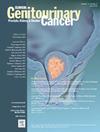Impact of HRR Gene Subclass on Clinical Outcomes of PARP Inhibitors in Metastatic Castration-Resistant Prostate Cancer
IF 2.7
3区 医学
Q3 ONCOLOGY
引用次数: 0
Abstract
Objective
This retrospective study evaluates the clinical significance of mutations in effector genes (BRCA1, BRCA2, PALB2, RAD51, FANCD2) versus sensor genes (ATM, ATR, CHEK1, CHEK2, NBS1) in patients with metastatic castration-resistant prostate cancer (mCRPC) classified as homologous recombination deficiency (HRD)-positive. The study assesses their predictive value for response to poly(ADP-ribose) polymerase inhibitors (PARPi) combined with androgen receptor signaling inhibitors (ARSi).
Design
A multicenter, retrospective real-world study conducted across 6 oncology hospitals in Bulgaria. Patient data were obtained through a formal request to the Ministry of Health’s United Information Portal, an electronic health records repository. The analysis included mCRPC patients treated with olaparib plus abiraterone who underwent next-generation sequencing (NGS) between January 1, 2022, and January 1, 2025, conducted in a certified national reference laboratory, with a median follow-up of 16 months. The primary endpoints were overall survival (OS) and progression-free survival (PFS).
Results
Of the 210 mCRPC patients screened via NGS, 28% (n = 58) harbored mutations in at least one HRR gene, classified as sensor (n = 27) or effector (n = 31). Patients with effector mutations demonstrated a statistically significant improvement in PFS compared to those with sensor mutations (median PFS: 20 vs. 14 months, HR = 0.48, 95% CI: 0.252–0.914, P = .0294). Similarly, overall survival (OS) was significantly prolonged in the effector group. While the median OS for the sensor group was 19 months, the effector group had not yet reached median OS at the time of analysis (HR = 0.38, 95% CI, 0.154-0.945, P = .0373). Logistic regression analysis and PSM supported findings.
Conclusion
Patients with mCRPC harboring effector HRR mutations derive greater clinical benefit from PARPi plus ARSi than those with sensor mutations. These findings highlight the heterogeneous predictive value of HRR gene alterations and suggest that mutation sub-class should guide treatment decisions in HRD-positive mCRPC.
HRR基因亚类对PARP抑制剂治疗转移性去势抵抗性前列腺癌临床结果的影响
目的:本回顾性研究评价同源重组缺陷(HRD)阳性转移性去势抵抗性前列腺癌(mCRPC)患者中效应基因(BRCA1、BRCA2、PALB2、RAD51、FANCD2)与传感基因(ATM、ATR、CHEK1、CHEK2、NBS1)突变的临床意义。该研究评估了它们对聚(adp -核糖)聚合酶抑制剂(PARPi)联合雄激素受体信号抑制剂(ARSi)反应的预测价值。设计:保加利亚6家肿瘤医院开展的一项多中心、回顾性现实世界研究。患者数据是通过向卫生部联合信息门户(一个电子健康记录存储库)提出的正式请求获得的。该分析包括在2022年1月1日至2025年1月1日期间接受奥拉帕尼加阿比特龙治疗的mCRPC患者,这些患者在经过认证的国家参考实验室进行了下一代测序(NGS),中位随访时间为16个月。主要终点是总生存期(OS)和无进展生存期(PFS)。结果:在通过NGS筛选的210例mCRPC患者中,28% (n = 58)至少有一个HRR基因突变,分类为传感器(n = 27)或效应(n = 31)。与传感器突变患者相比,效应突变患者的PFS有统计学意义的改善(中位PFS: 20个月vs 14个月,HR = 0.48, 95% CI: 0.252-0.914, P = 0.0294)。同样,效应组的总生存期(OS)明显延长。传感器组的中位生存期为19个月,而效应组在分析时尚未达到中位生存期(HR = 0.38, 95% CI, 0.154-0.945, P = 0.073)。逻辑回归分析和PSM支持研究结果。结论:携带HRR效应突变的mCRPC患者从PARPi + ARSi中获得的临床获益大于携带传感器突变的患者。这些发现强调了HRR基因改变的异质性预测价值,并提示突变亚类应该指导HRR阳性mCRPC的治疗决策。
本文章由计算机程序翻译,如有差异,请以英文原文为准。
求助全文
约1分钟内获得全文
求助全文
来源期刊

Clinical genitourinary cancer
医学-泌尿学与肾脏学
CiteScore
5.20
自引率
6.20%
发文量
201
审稿时长
54 days
期刊介绍:
Clinical Genitourinary Cancer is a peer-reviewed journal that publishes original articles describing various aspects of clinical and translational research in genitourinary cancers. Clinical Genitourinary Cancer is devoted to articles on detection, diagnosis, prevention, and treatment of genitourinary cancers. The main emphasis is on recent scientific developments in all areas related to genitourinary malignancies. Specific areas of interest include clinical research and mechanistic approaches; drug sensitivity and resistance; gene and antisense therapy; pathology, markers, and prognostic indicators; chemoprevention strategies; multimodality therapy; and integration of various approaches.
 求助内容:
求助内容: 应助结果提醒方式:
应助结果提醒方式:


